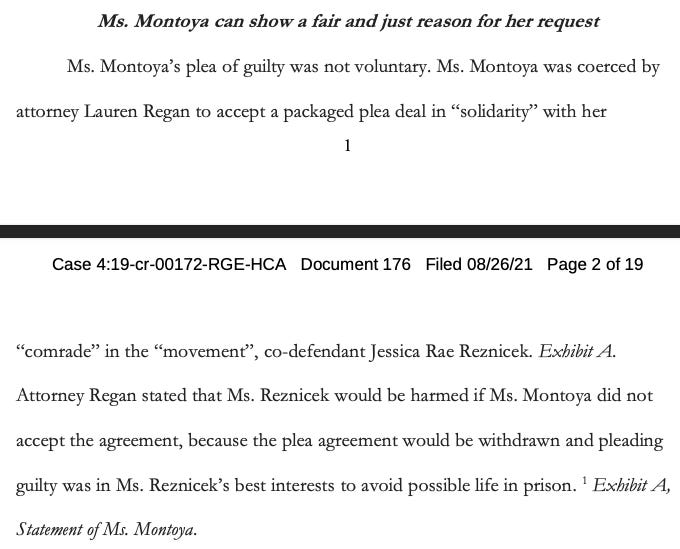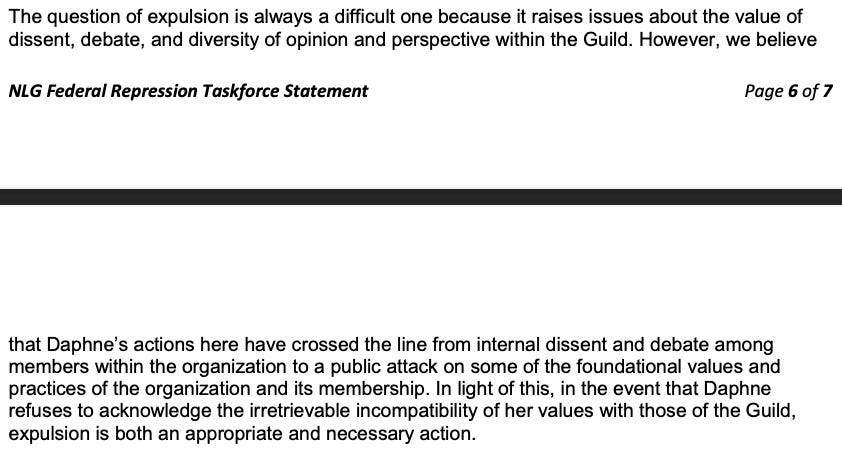One of my favorite topics to talk about is the ethics of conflicts of interest. It’s important, it has endless complexities arising from a few simple rules, and it’s little understood by either clients or lawyers.
Two interesting case studies this week on that topic.
The Crumbley Case
In Michigan, James and Jennifer Crumbley, accused of involuntary manslaughter in connection with their son’s alleged school-shooting murder of four people, have appeared in court with hired counsel, while their 15-year-old son Ethan has a court-appointed lawyer.

It’s not clear to me that this is really significant—the parents obtained counsel before being arrested, when appointed counsel was not yet available to them; and representation of the parents for involuntary manslaughter is a whole nother game than representation of the child for multiple murders.
Among other reasons they might have hired counsel for themselves but not for their son, it’s possible that the Crumbleys could not afford counsel for a juvenile murder case, but could afford counsel for themselves.
It’s possible that they were advised that whoever was appointed to Ethan’s case is already the best lawyer for the job.
It’s also possible that they have all the money in the world but are shit parents.
My old blawgosphere colleague Patrick had very specific ethical opinions, however, about why the Crumbleys didn’t hire a lawyer for Ethan:




Defense lawyers get paid all the damn time by people (including codefendants) whose best interests may well include throwing the client under the bus. It’s so common that I have a standard clause in my contract when a third party (such as dad) is paying for the defense:
To reinforce the lesson that my duty is only to Junior I’ll even send John Sr. out of the room and talk to John Jr. privately before accepting the case.
There are lawyers who are tempted to—and do—betray their clients’ interests for their own, but these are the pathological exception rather than the norm. I’m not disputing Patrick’s claim that he is afraid he’d be tempted to let the paying parents interfere with their defense of the son, but I assure you: criminal-defense lawyers, if they’re at all ethical, have no such temptation.
“He who pays the piper calls the tune” is an argument made by indigent defendants against court-appointed lawyers and public defenders. It’s as wrong when a lawyer on twitter says it about hired lawyers as when a jailed sovereign citizen says it about appointed lawyers. If lawyers couldn’t ethically take money from people who might want to see the client tossed under the bus, no ethical lawyer would ever take state money to keep a criminal defendant out of a box.
It’s true that there would be a conflict of interest preventing a lawyer from representing both Ethan and his parents. I’m a conflict-hawk, and I wouldn’t represent both parents together, much less represent both Ethan and the parents. But if I let the third party paying—dad or Uncle Sam or whoever—call the tune, I’d be in the wrong line of work.
(This is, by the way, a good reason that a criminal-defense lawyer should get paid up front. If she’s taking payments from John Sr., he may think he has some claim to interference with the defense.)
What’s more important than money? Principle.
The Criminal-Defense Principle
The Criminal-Defense Principle is that, within the bounds of law, the client’s legal interests are paramount. Other people have other principles, but what makes a criminal-defense lawyer is the Criminal-Defense Principle. We exist, professionally, only for the benefit of the Client Singular, the particular person whose matter we are dealing with at this moment. It is only by giving the full measure of our ability to the Client Singular that our profession creates a better world. We defend civil liberties by defending the civil liberties of the Client Singular.
We may want social justice or equity or the salvation of mankind, but all of these interests take a back seat to the interests of the Client Singular, or else we are being something other than criminal-defense lawyers.
Which brings us to …
The Montoya Case
(Links to the pleadings in the case, the source for the facts not cited, are here.)


When I saw this tweet, I responded, “If true, no lawyer should belong” to the National Lawyers Guild.
Then I thought about my dear friend Daphne Silverman, who organized the Houston chapter of the National Lawyers Guild. I wonder what Daphne would think of this.
Then I read the Unicorn Riot article that David linked to, and I found out!
Montoya’s current attorney, Daphne Silverman, refused to comment on whether Montoya is or has been cooperating with law enforcement. “As a lawyer representing Ruby Montoya,” Silverman said, “I owe Ms. Montoya a duty to represent her interests alone, which requires me to place those interests paramount and not be held back by any conflicts of interest, including the interests of a movement or another individual.”
The Conflict
The Unicorn Riot author has issues with The Criminal-Defense Principle, and especially with the possibility that Montoya might be cooperating with the Government to reduce her own sentence:
Since summer 2021, Montoya’s lawyer has repeatedly filed motions on her behalf asking the court to allow her to file documents under seal—a practice typically avoided by those facing political charges in an effort to be transparent about engagement with law enforcement and the courts.
and
As Montoya scrambles to cast blame on others, the climate movement around her faces fundamental questions about cooperation with law enforcement and movement lawyering. Movement lawyering is a term for legal defense strategies that consider the needs of and take direction from broader political movements in its defense of individual activists.
This sets up the conflict: The Defense Principle (represented by Daphne) vs. Movement Lawyering (represented by the Unicorn Riot and everyone else it quotes in the article).
A Large Amount of Background
The focus of the conflict is Ruby Montoya, who (according to Ruby and other members of her family) grew up physically and mentally abused by her father Stephen Montoya, a Yale-trained civil-rights lawyer, and sexually abused by the husband of the babysitter that Stephen had hired to watch her.
As a result of her abusive childhood, Ruby was unusually susceptible to persuasion.
This susceptibility led her to damage the pipeline property. According to TigerSwan (the private security company paid by the pipeline company, the equivalent of the Pinkertons of the 1890s) she “appeared to be brainwashed.”
Ruby was in due course arrested and indicted in federal court, and was appointed a CJA Panel lawyer, Angela Campbell. Campbell would become a minor player in this drama, as Lauren Regan volunteered to represent Ruby. As far as the U.S. District Court was concerned, Regan was Campbell’s pro bono second chair, but this was a pretense: Regan was in fact lead counsel, and Campbell was local counsel.
As part of her representation. Regan had her client Ruby sign a Joint Defense Agreement with Ruby’s codefendant Jessica Reznicek. (This becomes important later.)
Regan, who does business under the trade name “Civil Liberties Defense Center,” did not investigate the possible defenses to the case, including entrapment. Nor did she investigate Ruby’s traumatic history, which would at least mitigate Ruby’s culpability, if not lead to a defense based on Ruby’s lack of a culpable mental state. Ruby sent Regan emails asking her to look into things, and Regan did not follow up.
Instead Regan advised Ruby to plead guilty, according to Daphne, “in solidarity” with Reznicek.
Regan has a history of doing this.
Stephen Montoya, also involved in the defense, also advised his abused daughter to plead guilty, possibly motivated by his desire that years of his abuse of children and wives not come to public light.
And as Ruby was susceptible to the suggestion of sabotage, so was she susceptible to the suggestion of a guilty plea in solidarity with her codefendant. She pleaded guilty on January 21, 2021. She then fired Regan, and Campbell was her only lawyer.
In April—after the Presentence Investigation Report was filed with the court—Ruby asked Campbell to help her withdraw her guilty plea. She then reached out to Daphne. Daphne moved to substitute in for Campbell. The court expressed some doubt about Daphne having violated ethical rules by speaking to a represented party (a common ignorant mistake among lawyers and judges: a lawyer may speak to a represented party as long as she is not doing so on behalf of another client involved in the subject matter of the discussion) and about Daphne having a conflict of interest because of representing movements or organizations.
Daphne explained to the court why these concerns were unfounded, and on August 26, 2021 was substituted in for Campbell.
On the same day Daphne filed a Motion to Withdraw Plea of Guilty on behalf of Montoya. Regan then sought to have Daphne expelled from the National Lawyers Guild.
On November 24, 2021, Daphne filed a Supplement to Motion to Withdraw Plea of Guilty.
The NLG Response
From behind the conver of anyonymity, this faction of the National Lawyers Guild, styling itself the “Federal Repression Taskforce” (ooooo) issued this statement:
It’s really an amazing document. It asserts that Daphne’s Motion to Withdraw Plea of Guilty
attacks some of the Guild’s foundational principles and practices around movement lawyering and argues that lawyers with leadership positions in organizations that “support” social movements have an inherent conflict of interest with any individual movement participant that they represent.
And in making this argument the task force inadvertently proves that not only do lawyers with leadership positions in movement organziations have an inherent conflict of interest, but all NLG member lawyers have an inherent conflict of interest that should keep them from representing clients in criminal court.
This is a case in which the association would have been better served keeping its mouth shut. The Taskforce Statement will rightly be Exhibit 1 for prosecutors seeking to keep NLG members from appearing for defendants in criminal cases.
The JDA
The task force writes:
Non-cooperating joint defense agreements are one of the primary ways in which movement lawyers can support defendants who aim to minimize legal liability for both themselves and their cohort. Such agreements, grounded in the common interest privilege, enable defendants to share information without violating or waiving the attorney-client privilege, and bind the parties to an agreement that they will not disclose any of that privileged information to anyone who is not a party to the agreement.
“Non-cooperating” joint-defense agreements (JDAs) are probably unethical for lawyers to advise their clients to enter into, because the client signing such an agreement has no idea whether she is going to want or need to cooperate against the other defendants. The client sets the goals of representation, and it’d be extraordinary for a lawyer to be justified in advising a client to enter into an agreement with third parties (not the government) that the client couldn’t revoke as facts developed.
I’m not questioning the validity of JDAs generally (though I could!)—it might be advisable for a client to enter into an information-sharing agreement with codefendants, and agree not to share information outside the agreement. But such an agreement is always revocable: I’m leaving our deal now; don’t tell me anything else. I think that there’s a good argument that the lawyer has a duty, even after leaving the JDA, not to share information out of it.
But a client cannot possibly enter into an irrevocable agreement with a third party restricting him from cooperating with the government. A lawyer might not like cooperating with the government, as I don’t like it, but if it’s in the client’s best interest and the client wants to do it the lawyer had better either get on board or help the client get another lawyer who will. An agreement otherwise would be unenforceable (and a lawyer caught preventing his client from cooperating with the government against the client’s wishes might find himself indicted for obstructing justice).
Why would the task force even refer to non-cooperating JDAs, when in this case the JDA didn’t even purport to be such? Here’s the agreement in this case:
Some highlights:
Each client expressly acknowledges that attorneys representing other clients to this Agreement owe an uncompromising duty of loyalty to their own respective client and to no other Party.
And:
To further the mutual interests of the clients in promoting common defenses and sharing mutually beneficial legal strategies in the face of anticipated litigation or other proceedings referenced above, counsel and their respective clients agree:
(a) To share and exchange among themselves and their clients, as each counsel deems appropriate given the unique interests and concerns of his or her client; witness statements and interview summaries….
(My emphasis.) And:
It is expressly understood that each client has the right to use any information or communication in his possession, including communications otherwise covered by this Agreement, in his defense in any trial where he is a defendant and where no Agreement with the government limits his exposure to charges or punishment at the trial.
And apropos of “non-cooperation.”
The Parties understand and acknowledge that each attorney-signatory to this Agreement has an obligation to zealously represent his or her own client to the exclusion of all other interests. Thus, before the Matters conclude, each attorney may need to, and is free to take action that may be contrary to the interests of other Parties to this Agreement. These actions include, but are not limited to (a) advising a client to cooperate with the government or to settle an adverse proceeding, (b) generating and disclosing evidence or information to the government or third parties (apart from information protected by this Agreement), and (c) cross-examining other clients at trial or other proceedings, should such clients testify.
So the task force’s defense of non-cooperating JDAs has nothing to do with Ruby’s case.
The express agreement between Regan and Ruby was that Regan would zealously represent Ruby “to the exclusion of all other interests.” If, as Ruby alleges, Regan did not do so, then her not doing so proves that her movement affiliation actually conflicted with her Ruby’s interests. That doesn’t prove that any movement affiliation creates an inherent conflict, but it supports it.
Scare Quotes
The use of scare quotes in Daphne’s motion around the words “solidarity,” “movement,” and “comrade,” for example, denigrates the legitimacy and importance of movement lawyering. Regardless of her intent, the motion implies that solidarity with co-defendants and concern for the impact to social movements are not legitimate client concerns. To the contrary, many activist-clients choose to center goals that extend beyond the direct legal outcome of their cases.
Surely those might be client interests. But those are not scare quotes. Ruby’s complaint is that Regan used those words to coerce her (suggestible after a lifetime of trauma, “looking for parent figures … looking for a cause bigger than herself”) to plead guilty, despite the lawyers’ failure to investigate any defenses, to an agreement not beneficial to her.
Ruby’s complaint is that Regan sought to martyr her without her informed consent. Given her special vulnerability, Regan and NLG probably should have kept their mouths shut and taken the “L.”
This is all object level, though. The meta is, as is often the case, much simpler and more important.
The Crux of the Matter
Set aside the object level. Set aside the doubt quotes and the words used. The NLG is threatening to remove a member—a member with a long history of dedication to the organization and its causes—because of what she did for a client.
Ruby wants to withdraw her plea. Following the Criminal-Defense Principle. Daphne’s job is to help Ruby do so.
If Daphne can convince the court that Regan had a conflict of interest, the court may let Ruby withdraw her plea. Therefore Daphne’s job is to convince the court that Regan had a conflict of interest.
NLG is threatening to remove Daphne from the organization for doing her job—the job that any competent criminal-defense lawyer would do.
This damns not only the organization—What sort of lawyers’ organization damns its members for doing their job for their clients?—but also its members—What sort of lawyers pay dues to an organization that will damn them for doing their job for their clients?
By threatening to expel Daphne for suggesting that association with an organization such as NLG may create an inherent conflict with the interests of the Client Singular, NLG demonstrates that membership in NLG creates an inherent conflict with the interests of every client.
Well done, you anonymous bunch of fucking clowns.
Well done.
(Below the payline: Saboteurs in Cheap Suits.)
Keep reading with a 7-day free trial
Subscribe to Defending People to keep reading this post and get 7 days of free access to the full post archives.











